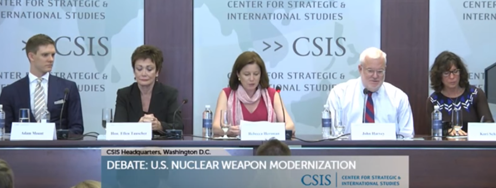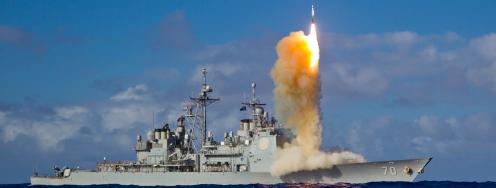Definition of Success is Fluid on Missile Defense
On the radar: Pentagon hid missile defense failure; NATO shouldn’t invest in Aegis; The proliferation of cyberweapons; Time is right for no first use; and the Timbie Forum begins next week
Missile defense a failure - “An interceptor launched from Vandenberg Air Force Base in California was to make a close fly-by of a mock enemy warhead high above the Pacific… The missile agency issued a news release that day touting a ‘successful flight test.’ The agency’s lead contractors were no less effusive. Aerojet Rocketdyne Inc., maker of the thrusters, said the new model ‘successfully performed its mission-critical role,’” reports David Willman for the Los Angeles Times.
--“In fact, the test was not a success, the Los Angeles Times has learned. One of the thrusters malfunctioned, causing the interceptor to fly far off-course, according to Pentagon scientists. The mishap raises fresh questions about the Ground-based Midcourse Defense system, the network of ground-launched interceptors that is supposed to protect the United States against a nuclear attack.”
--“The system, known as GMD, has cost taxpayers more than $40 billion since it was declared operational in 2004. It is being expanded at a rapid pace despite stubborn technical problems that have undermined its reliability.In carefully scripted tests, the system has failed to intercept and destroy mock warheads about half the time.” Full piece here. http://lat.ms/29ldtvL
NATO should wait on missile defense - “Given that missile defense has been a driver of tensions between Moscow and Washington since Ronald Reagan launched his Star Wars plan to render ballistic missiles ‘impotent and obsolete,’ one of the best ways to achieve reassurance and avoid provocation would be to alter the existing timetable for deploying more capable missile defenses in Europe,” writes Greg Thielmann for The Hill.
--“The recently released report of the U.S.-Russian-German Deep Cuts Commission called for postponement of EPAA [European Phased Adaptive Approach ] Phase 3 deployments, stressing that such a move would be consistent with official NATO policy as expressed in the 2014 NATO summit declaration; ‘Should international efforts reduce the threats posed by ballistic missile proliferation, NATO missile defence can and will adapt accordingly.’” Full piece here. http://bit.ly/29AROSF
The Cyber threat - “I have been largely ignoring the new cyberweapons that many talk about but few really get. After seeing Alex Gibney’s new thriller, Zero Days, which opens nation-wide July 8, I now believe these pose a greater threat to America than any other weapon save nuclear. And like nuclear weapons, the United States created them, used them first and they have now spread around the world.” writes Ploughshares Fund President Joe Cirincione for The Huffington Post.
--“Cyberweapons can replace suicide bombs. They can take over a rail system, switch tracks and crash trains. They can close valves on a gas pipeline and cause an explosion. Basically, they can sabotage anything run by electronic controls… What if someone did that to us? What if someone infiltrated our nuclear command and control so that if we pushed the button, nothing happened? Or if something did happen even without our pushing the button?” Full piece here. http://huff.to/29qJSVo
See also -“How nuclear deal has cooled Iran-US cyberwar,” by Narges Bajoghli for Al-Monitor http://bit.ly/29qG5HC
No-first-use needed - “On June 6, deputy national security adviser Ben Rhodes pledged that the president ‘will continue to review whether there are additional steps that can be taken to reduce the role of nuclear weapons in our own strategies and to reduce the risk of inadvertent use.’ One very important step would be for Obama to declare that the United States will not be the first to use nuclear weapons. Such a decision could unwind dangerous Cold War-era thinking and greatly strengthen U.S. and global security,” writes Daryl Kimball for Arms Control Today.
--“By adopting a no-first-use policy, the United States could positively influence the nuclear doctrines of other nuclear-armed states, particularly in Asia. Such a shift in U.S. declaratory policy could also alleviate concerns that U.S. ballistic missile defenses might be used to negate the retaliatory potential of China and Russia following a pre-emptive U.S. nuclear attack against their strategic forces. Shifting to a no-first-use policy would not, in any way, undermine the U.S. ability to deter nuclear attack by another state.” Full piece here. http://bit.ly/29koInP
See also - “Alliances and No First Use,” by Michael Krepon for Arms Control Wonk.http://bit.ly/29yY2Fo
Tweet - DarylGKimball: New @ArmsControlNow factsheet: "Nuclear Declaratory Policy and Negative Security Assurances" http://bit.ly/29kwChd
Don’t miss the Timbie Forum - Make sure to attend this year’s James Timbie Forum on Arms Control and Nonproliferation on July 14 and 15. The event’s first day will feature Kelsey Davenport of the Arms Control Association, Smitri Keshari, Director of “the bomb,” and others. The second day will feature Colin Kahl, National Security Advisor to Vice President Biden, David Sanger of The New York Times and others. Register here. http://bit.ly/28Mit1u
Tweet - @Gottemoeller: Thrilled to announce that @SecDef19 William Perry will deliver the 7/14 morning keynote at the Timbie Forum. RSVP: https://t.co/oJzEP6gCx7
Quick Hits:
--“A French View on the Iran Deal: An Interview With Ambassador Gérard Araud,” by Elizabeth Philipp for Arms Control Today. http://bit.ly/29t51h0
--“Fate of Nuclear Sub Base in Scotland Unclear after Brexit,” by Richard Sisk for Military.com. http://bit.ly/29dralG
--“Henry Kissinger’s Tactical Nuclear Shadow,” by Jeffrey Frank for The New Yorker. http://bit.ly/29ksPQV
--“The Tests That Showed the World the Horrifying Power of Nuclear Weapons,” by Kyle Mizokami for Popular Mechanics. http://bit.ly/29B1D2J
Events:
--“Worth Deferring: A Sino-Japanese Plutonium Production Race,” with Gordon Oehler, former director of CIA Nonproliferation Center; Henry Sokolski, Nonproliferation Policy Education Center; and Mark Holt, Congressional Research Service. July 11 from 11:30 a.m. to 1:15 p.m. at the Capitol Visitor's Center, SVC 203-02, Washington. Sponsored by Arms Control Association and Foreign Policy Initiative. RSVP online. http://bit.ly/29majK6
--“Senate Perspectives on Nuclear Deterrence, Arms Control and Proliferation,” featuring Sen. Joe Donnelly (D-IN). July 12 at 8:00 a.m. at the Capitol Hill Club, 300 First St. SE, Washington. Part of the Huessy Congressional Breakfast Seminar Series. RSVP online. http://conta.cc/25ULZFH
--“Nuclear Proliferation Success and Failure: Iran and North Korea webinar,” Mark Fitzpatrick, International Institute for Strategic Studies. July 14 from 10:00-11:00 a.m. BST, RSVP online. http://bit.ly/2978mP9
--The James Timbie Forum for Arms Control and Nonproliferation. At the State Department (July 14) and George Washington University (July 15). Register here. http://bit.ly/28Mit1u



